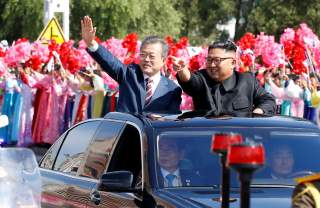The Hanoi Summit – We Asked Dagyum Kate Ji What Happens Next in U.S.-North Korea Relations
"South Korea should encourage Pyongyang and Washington to sufficiently and deeply look into the underlying problems causing the failure of the Hanoi summit."
Editor’s Note: Looking for more opinions on where we go after the Hanoi summit? Check out all 80 expert takes on where U.S-North Korea relations go next here.
No one can precisely predict the course that Washington and Pyongyang will take in the future. But the next step of relations between the Democratic People’s Republic of Korea (DPRK) and the United States could largely depend on the three factors: progress in taking the current working-level negotiation platform to a new level, Kim Jong-un’s stance on nuclear talks, and Seoul’s approach to its mediation.
The breakdown of the Hanoi summit, once again, clearly shows the lack of substantial, detailed, and technical discussions at a working-level. This is despite Washington and Pyongyang having set up a working group last July to deal with “nitty-gritty stuff” including the validation of efforts to achieve denuclearization.
One example is that both sides have not come to an agreement on the precise definition of the Yongbyon nuclear complex. (Although North Korea expressed its willingness to permanently dismantle it in accordance with the U.S. corresponding measures in the Pyongyang Joint Declaration.)
My question is: what is the implication issue that was not sufficiently discussed at their pre-summit talks? Without a platform where America and North Korea can have a substantive discussion—even with the presence of nuclear technicians—both countries will not be able to make any progress from their abstract agreement signed by Donald Trump and Kim in Singapore.
Given that the problems including the relaxation of sanctions cannot be simply resolved with the top-down approach, they should find a way to avoid a summit solely for the sake of a summit like this time in order to get back on the right track.
Secondly, the determination of North Korean leader Kim—who directly went through the bitter experience of failure in negotiating with Washington for the first time—is also one of the critical variables.
Though this is the repeated history between the United States and North Korea, Kim is the first DPRK leader who proceeded nuclear negotiations with U.S. President based on a summit-driven and top-down approach. As DPRK vice-foreign minister Choe Son-hui said following the summit, Kim might lose his will to push ahead with the deal with Washington.
Pyongyang’s failure to persuade Washington in partially easing United Nations Security Council resolution sanctions might also give Kim a lesson on how much it is difficult to be integrated into the international community.
Thirdly, South Korean president Moon Jae-in government’s role as a mediator would affect the progress in taking post-summit measures although there is not much room left for Seoul to intervene in DPRK-U.S. negotiations compared to the last year.
Seoul’s hasty attempt for arbitration might have a negative ramification, in my opinion. And in the same vein, South Korea should encourage Pyongyang and Washington to sufficiently and deeply look into the underlying problems causing the failure of the Hanoi summit.
There are not many incentives including inter-Korean economic cooperation that Seoul can provide for Pyongyang to accelerate denuclearization, and it may diminish South Korea’s leverage in further inter-Korean negotiations.
But South Korea’s efforts to prevent either country from losing the momentum of the talks is, without doubt, indispensable. Seoul could help Washington by examining if Kim’s intention to push forward denuclearization remains unchanged after the summit breakdown through multiple communication channels.
It must not be forgotten that Seoul is the one who provided an impetus to resume long-stalled DPRK-U.S. talks by guaranteeing Pyongyang’s willingness to denuclearize to Washington after dispatching the special delegation led by Chung Eui-yong in March 2018.
Dagyum Ji is a Senior Correspondent with NK News.
Image: Reuters

